Related Research Articles

A Masonic lodge, often termed a private lodge or constituent lodge, is the basic organisational unit of Freemasonry. It is also commonly used as a term for a building in which such a unit meets. Every new lodge must be warranted or chartered by a Grand Lodge, but is subject to its direction only in enforcing the published constitution of the jurisdiction. By exception the three surviving lodges that formed the world's first known grand lodge in London have the unique privilege to operate as time immemorial, i.e., without such warrant; only one other lodge operates without a warrant – the Grand Stewards' Lodge in London, although it is not also entitled to the "time immemorial" title. A Freemason is generally entitled to visit any lodge in any jurisdiction in amity with his own. In some jurisdictions this privilege is restricted to Master Masons. He is first usually required to check, and certify, the regularity of the relationship of the Lodge – and be able to satisfy that Lodge of his regularity of membership. Freemasons gather together as a Lodge to work the three basic Degrees of Entered Apprentice, Fellowcraft, and Master Mason.
The history of Freemasonry encompasses the origins, evolution and defining events of the fraternal organisation known as Freemasonry. It covers three phases. Firstly, the emergence of organised lodges of operative masons during the Middle Ages, then the admission of lay members as "accepted" or "speculative" masons, and finally the evolution of purely speculative lodges, and the emergence of Grand Lodges to govern them. The watershed in this process is generally taken to be the formation of the first Grand Lodge in London in 1717. The two difficulties facing historians are the paucity of written material, even down to the 19th century, and the misinformation generated by masons and non-masons alike from the earliest years.
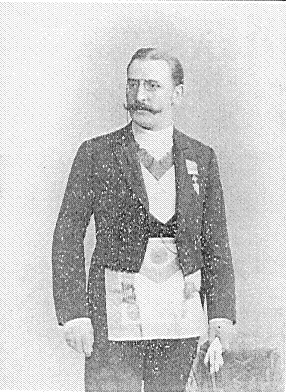
Albert Karl Theodor Reuss also known by his neo-Gnostic bishop title of Carolus Albertus Theodorus Peregrinus was an German tantric occultist, freemason, journalist, singer and head of Ordo Templi Orientis.
James Anderson was a Scottish writer and minister born and educated in Aberdeen, Scotland. He was ordained a minister in the Church of Scotland in 1707 and moved to London, where he ministered to the Glass House Street congregation until 1710, to the Presbyterian church in Swallow Street until 1734, and at Lisle Street Chapel until his death. He is reported to have lost a large sum of money in the South Sea Company crash of 1720. Anderson is best known for his association with Freemasonry.
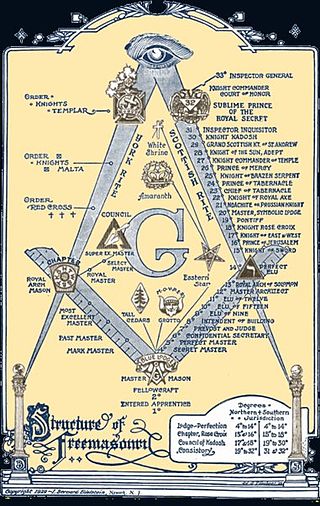
There are many organisations and orders which form part of the widespread fraternity of Freemasonry, each having its own structure and terminology. Collectively these may be referred to as Masonic bodies, Masonic orders or appendant bodies of Freemasonry.

The Illuminati is a name given to several groups, both real and fictitious. Historically, the name usually refers to the Bavarian Illuminati, an Enlightenment-era secret society founded on 1 May 1776 in Bavaria, today part of Germany. The society's stated goals were to oppose superstition, obscurantism, religious influence over public life, and abuses of state power. "The order of the day," they wrote in their general statutes, "is to put an end to the machinations of the purveyors of injustice, to control them without dominating them." The Illuminati—along with Freemasonry and other secret societies—were outlawed through edict by Charles Theodore, Elector of Bavaria, with the encouragement of the Catholic Church, in 1784, 1785, 1787 and 1790. During subsequent years, the group was generally vilified by conservative and religious critics who claimed that the Illuminati continued underground and were responsible for the French Revolution.
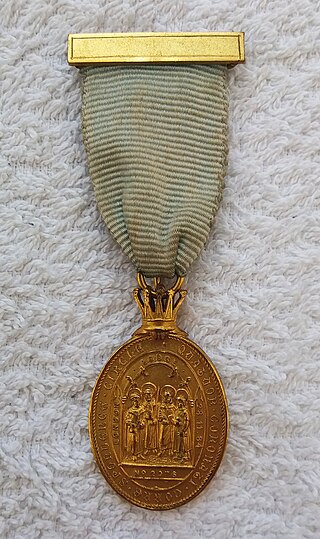
Quatuor Coronati Lodge No. 2076 is a Masonic Lodge in London dedicated to Masonic research. Founded in 1886, the Lodge meets at Freemasons' Hall, Great Queen Street.
There are a number of masonic manuscripts that are important in the study of the emergence of Freemasonry. Most numerous are the Old Charges or Constitutions. These documents outlined a "history" of masonry, tracing its origins to a biblical or classical root, followed by the regulations of the organisation, and the responsibilities of its different grades. More rare are old hand-written copies of ritual, affording a limited understanding of early masonic rites. All of those which pre-date the formation of Grand Lodges are found in Scotland and Ireland, and show such similarity that the Irish rituals are usually assumed to be of Scottish origin. The earliest Minutes of lodges formed before the first Grand Lodge are also located in Scotland. Early records of the first Grand Lodge in 1717 allow an elementary understanding of the immediate pre-Grand Lodge era and some insight into the personalities and events that shaped early-18th-century Freemasonry in Britain.

The Ancient Grand Lodge of England, as it is known today, or The Grand Lodge of the Most Ancient and Honourable Fraternity of Free and Accepted Masons as they described themselves on their warrants, was a rival Grand Lodge to the Premier Grand Lodge of England. It existed from 1751 until 1813 when the United Grand Lodge of England was created from the two Grand Lodges. They are now called the Antients, in contrast to the Moderns, the original Grand Lodge which its critics, notably Laurence Dermott, said had moved away from the ritual of Scotland, Ireland, and now the Antient Grand Lodge. This Grand Lodge was also informally called the Atholl Grand Lodge because the Third and Fourth Dukes of Atholl presided over it as Grand Masters for half of its 62-year existence.
Tracing boards are painted or printed illustrations depicting the various emblems and symbols of Freemasonry. They can be used as teaching aids during the lectures that follow each of the Masonic Degrees, when an experienced member explains the various concepts of Freemasonry to new members. They can also be used by experienced members as reminders of the concepts they learned as they went through the ceremonies of the different masonic degrees.
S. Brent Morris is an American author who writes on Freemasonry. He is a Master Mason, a 33° Scottish Rite Mason, and retired in 2021 as the editor of The Scottish Rite Journal, a publication of the Supreme Council of the Scottish Rite Southern Jurisdiction.

A Research lodge is a particular type of Masonic lodge which is devoted to Masonic research. It is a lodge, and as such has a charter from some Grand Lodge. However, it does not confer degrees, and restricts membership to Master Masons of some jurisdiction in amity with the jurisdiction that the research lodge is in. Related to research lodges are Masonic research societies, which serve the same purpose but function fundamentally differently. There are research lodges in most countries where Freemasonry exists.
The Grand Lodge of British Freemasonry in Germany is a Masonic Grand Lodge in Germany working in the English language and following English Masonic traditions. It was founded as a District Lodge in 1957 and after various transformations was eventually recognised as Grand Lodge in 1980. This Grand Lodge is one of the five United Grand Lodges of Germany (VGLvD). It currently has members from a variety of nations and in addition to the "resident members" in Germany, there are "non-resident members" all over the world. Currently, 19 lodges work under the GL BFG, mainly in North Rhine-Westphalia, but also in Lower Saxony, Hamburg, Munich, Berlin and also near Frankfurt.
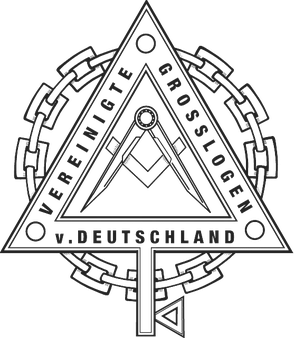
The United Grand Lodges of Germany is an association (confederation) of the five Grand Lodges of Freemasons in Germany which are recognized as regular by the United Grand Lodge of England, and represents them all at an international level.

Adolphus Frederick Alexander Woodford (1821–1887) was the eldest son of Alexander George Woodford, a career soldier who was already a hero of Waterloo, and would rise to Field Marshal, ending his days in command of Chelsea Hospital. After a short stay in the Coldstream Guards, Adolphus entered the Anglican Church, having the living of Swillington from 1847–1872. On leaving the Army, he also became a Freemason, rising to become Grand Chaplain in 1863, commuting from Yorkshire to his London duties.
Freemasonry in Germany started in several places during the second quarter of the Eighteenth century. After the extinction of the Rite of Strict Observance, which had a wide following and claimed Templar origins for its higher degrees, the several Grand Lodges in Germany defied all attempts at unification, although a largely ineffectual central organisation came into being with the unification of Germany. During the 1920s Freemasons were harassed alongside Jews by those taken in by the Protocols of the Elders of Zion, and blamed for the German surrender of 1918. This culminated with the suppression of Freemasonry by the Nazis in 1935, with many Masons in Germany and occupied countries being executed or sent to concentration camps. Freemasonry returned to Germany after World War Two. A single central body now represents five "regular" Grand Lodges. Liberal, women's, and mixed lodges also exist.
The American Canadian Grand Lodge AF&AM (ACGL) is a Grand Lodge of Freemasonry. It arose initially from Square and Compass clubs founded by US and Canadian freemasons serving in occupied postwar Germany. Many of these received charters from North American Grand Lodges to establish Masonic Lodges.
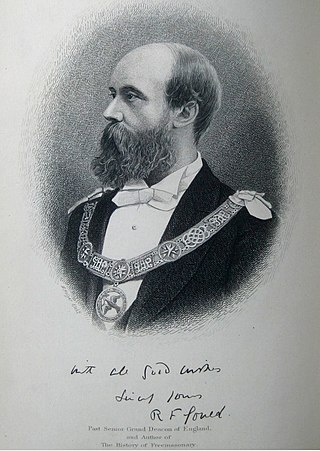
Robert Freke Gould was a soldier, barrister and prominent Freemason and Masonic historian. He wrote a History of Freemasonry, which remains a standard reference work on the subject.
Isaac Newton University Lodge No 859 is a Masonic Lodge based at the University of Cambridge for matriculated members of the university. As of 2013 there were approximately 200 members. This is about half the 397 subscribing members in 1955. The lodge meets at Bateman Street Masonic Hall, with the lodge's badge or standard a combination of Isaac Newton's coat of arms and the University of Cambridge's coat of arms. The lodge is also a member of the Association of Medical, university, and Legal Lodges.
References
- ↑ "QCCC has a new Local Secretary in Germany". Quatuor Coronati. 2019-09-10. Retrieved 2019-10-21.
- 1 2 "American Canadian Grand Lodge - District #4". pub.acgl.eu. Retrieved 2019-10-23.
- ↑ "Conference of Grand Masters of Masons in North America" . Retrieved 2019-10-21.
- ↑ "Grand Lodges in the US, Canada, and Mexico". The Masonic Society. Retrieved 2019-10-21.
- ↑ "Louisville 2020 Photos - Conference Grand Masters". COGNMA. Retrieved 2019-10-21.
- ↑ "Heritage - Bavaria Lodge No. 935". Bavaria Lodge No. 935.
- ↑ "American Canadian Grand Lodge".
- ↑ "Louisville 2020 Photos - Conference Grand Masters - Top: Jan Savarino-ACGL". COGNMA. Retrieved 2022-03-28.
- ↑ "Louie E. Conine". info.acgl.eu. Retrieved 2019-10-24.